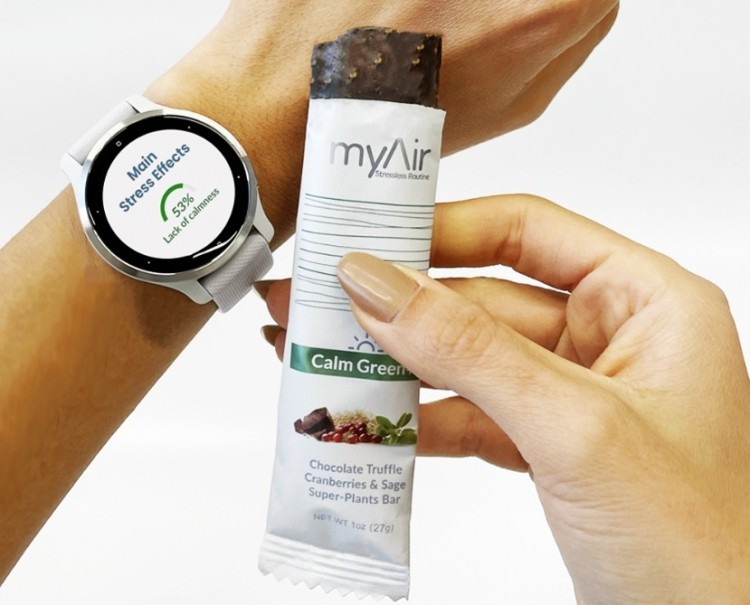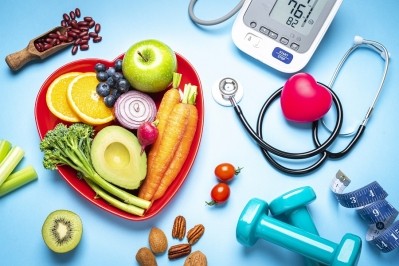myAir blends technology with food as medicine to tackle growing stress pandemic

The strategy of personalizing nutrition to achieve a health or wellness goal, such as reducing bad cholesterol, managing diabetes or, in the case of myAir, reducing stress, is well-documented as effective – but offering such services on a mass scale to create long-term, sustained change (and consumer relationships) requires a reliable feedback loop that can accurately and efficiently assess the impact of dietary recommendations and make adjustments as needed.
While strategies of assessing bloodwork or stool samples or even one-on-one interactions to measure the impact of dietary changes or other interventions are effective, they often come with a time delay that misses nuances, delays adjustments and limits the overall consumer experience so that long-term consumer loyalty can be elusive.
But myAir’s use of data tracked in real time via smart watches, including heart rate, respiration, sleep quality and physical activity offers an “ongoing solution” to the “ongoing problem” of stress. It provides consumers near immediate feedback and insights about their stress levels and health through a dashboard that highlights how stress changes throughout the day and week, how to make the most of their sleep, and how their sleep quality affects their focus the next day, among other variables.
myAir uses this same data to recommend customized, plant-based adaptogenic nutrition bars that can help users further reduce and manage their stress daily, company founder Rachel Yarcony told FoodNavigator-USA.
“Each one of our bars have a different formulation of super-plants proven to reduce stress. There are no medical drugs, no CBD, nothing like that. It is all natural and from food, including valerian, hops, passion flower, chamomile, sage, rosemary and more,” she said.
“It is all based on research and science,” she claimed, noting that as a former c-level executive at Teva Pharmaceuticals, Nestle and the Strauss Group she believes everything must be validated. “The proof is in the pudding.”
How it works
To determine which of the six myAir bars are best suited for someone, Yarcony says consumers must first fill out a scientifically validated cognitive questionnaire on myAir’s website that includes questions about sleep habits, interpersonal interactions, muscle tension, mental focus, what time of day they feel their best and more. Based on these responses, the AI identifies two main stress effects, such as lack of calmness or difficulty concentrating.
myAir then selects two of its bars best suited for addressing these top stress effects, such as the Calm Green+, aka ‘The Daytime Zen Master,’ made with sage, oats, lavender and other ingredients to help balance mood, or the Focused Yellow bar, aka ‘The Cognitive Enhancer,’ which features rosemary, eucalyptus, black pepper and green oats, to provide a mental pick-me-up. The other bars include Sleep Gray, Relaxed Purple, Energetic Pink and Comfortable Blue. All the bars are available in two forms – one with dates and one with chocolate.
Consumers navigating myAir through its website can then order a box of 20 bars – 10 of each recommended option – with the option to add on a Garmin vivosmart 4 to monitor the effects of stress and nutrition nd help assess if the bars are helping or if another herbal extract blend may be more beneficial.
“By connecting through your Garmin or Apple watch, our algorithm can calculate your mind and body parameters and give you insights and data about your stress that can help you understand yourself better and get nutrition recommendations not only for your bars, but other food that is relevant to your condition,” Yarcony said. “So, it’s a full package with measuring, personalized recommendations, and monitoring.”
Yarcony added: “The magic of myAir is the technology combined with the nutrition.”
myAir’s dual approach to marketing leverages DTC and employer subscriptions
Like most startups, myAir sells its products direct-to-consumer through its website, where it offers commitment-free monthly subscriptions of 20 bars for $50, but its primary go-to-market strategy is marketing its bars through employers as a benefit for staff.
“Eighty-three percent of employees suffer from stress and 60% say their employer doesn’t provide them tools to deal with that,” which makes it difficult for companies to maintain employees and maximize their performance, Yarcony said.
But by offering myAir to employees, companies can address both of these challenges, she said.
She explained that myAir offers a range of memberships and consultation services through its platform, but typically companies host an orientation for employees, who fill out the questionnaire and connect with myAir’s AI through the website, app and their smart watches and then the employer either provides an assortment of bars in the cafeteria or break room or has custom shipments sent to employees’ homes.
In exchange, employers gain de-identified, high-level insights about their employees that can serve as the foundation for ideas to create a less stressful work place and workforce.
“We see huge success with these programs with satisfaction rates upwards of 96% and consumers reporting they reduced their stress significantly,” Yarcony said.
Interest in food as medicine is on the rise
Part of what makes myAir successful is its use of food as medicine – a concept that has been gaining traction among consumers since the pandemic, which accelerated awareness of nutrition’s impact on immunity and overall health.
Consumers also are attracted to the concept because they are increasingly weary of pharmaceuticals and supplements and want preventive options with minimal side effects, said Yarcony. She explained, many people suffer from pill fatigue or have low long-term compliance with medicine and supplements because they can feel invasive or might not be engrained as a daily habit.
“Behavior change is hard, and the best way to make a new habit is to attach it to a current habit that you really love to do – and there is one habit that we all have to do, which is eating,” Yarcony said. “And so what we are doing at myAir is using food as a tool for behavior change, and this shift in mind means we are not a burden.”
[Editor’s note: Interested in learning more about how consumers are thinking about food as medicine? Join us for our three-day digital Summit where take a deep dive into the topic. Find the details and register HERE.]
‘I want to empower millions’
Given consumers’ rising interest in food as medicine and mental wellbeing, Yarcony said she believes that myAir is poised for growth in the coming years.
“I have huge dreams – I want to empower millions to manage stress through nutrition and think this is the right tool for us at this time when the pandemic has increased awareness about mental health, social responsibility and employee wellness,” she said.
As such, Yarcony said, myAir will focus on engaging US corporations in the near future, but the next market will be Japan, where stress and adoption of technology are both high, as is the understanding of plants’ power.

















